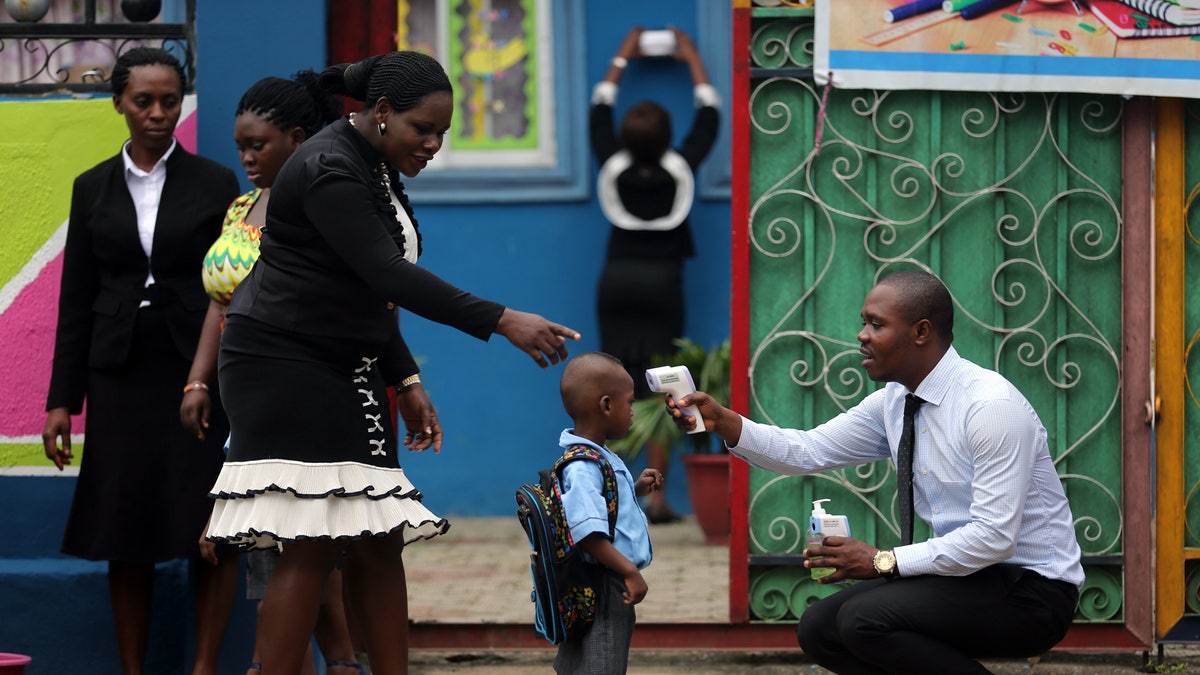
A school official takes a pupil's temperature using an infrared digital laser thermometer in front of the school premises, at the resumption of private schools, in Lagos in this September 22, 2014 file photo. REUTERS/Akintunde Akinleye
All schools in Guinea will reopen on Monday after being closed amid the deadly Ebola outbreak, Guinea's health minister said Friday.
Health minister Remy Lamah told The Associated Press in Accra, Ghana during a summit by the Economic Community of West African States that the action is being taken "because the situation has improved." In Liberia, the schools are reopening "next month," said the Liberian Embassy's Charges d'Affaires in Ghana, Musu Ruhle.
The developments mirror how Ebola is affecting the three hardest-hit nations. There have been gains against the virus, which is spread through contact with bodily fluids of a person showing symptoms, or of a corpse, in Guinea and Liberia, but the disease continues to spread in Sierra Leone.
Schools will remain closed in Sierra Leone, that country's health minister said.
"We are monitoring the situation and would take a decision after that," said Sierra Leone Health Minister Foday Sawi Lahai. "We have imported thermometers to be used for surveillance in the schools. Once that is done and the number of cases keep falling, we would consider (reopening schools)."
In the most recent 24-hour monitoring period, 16 new Ebola cases were discovered in Sierra Leone, according to government figures.
In the week ending Jan. 11, WHO said Guinea reported its lowest weekly total of new Ebola cases since mid-August. Liberia had its lowest total since the first week of June and no confirmed new cases for the final two days of the week.
At the summit in Ghana, member states were asked to set up Rapid Response Teams at national, district and regional levels as part of the preparedness and containment mechanisms against Ebola, ECOWAS said. Also attending are the World Health Organization, the African Union, the U.N. Mission for Ebola Emergency Response as well as EU and U.S. representatives, the statement said.
Ebola has claimed over 8,400 lives, WHO reported on Wednesday. U.N. Secretary-General Ban Ki-moon previously said the epidemic could be over by mid-2015 but WHO is now declining to set a specific timeline.
U.N.'s Ebola chief, Dr. David Nabarro, cautioned Thursday that despite the gains "there are still numbers of new cases that are alarming, and there are hotspots that are emerging in new places that make me believe there is still quite a lot of the disease that we're not seeing."
WHO says there are now enough beds to isolate and treat Ebola patients, but not all are in the hotspots where the disease is spreading fastest. The U.N. estimates that the number of scientists needed to track the outbreak must be tripled.
Nabarro told The Associated Press the national and international campaign for safe healing and burial practices, isolation of suspected cases, and quick treatment for Ebola victims is working. But he appealed for greater global support including "virus detectives" who can identify where there are cases, "anthropologists who can tell us how the communities are reacting," and managers to make sure treatment centers are adequately equipped.
United States Ambassador in Ghana, Gene Cretz, told a high level coordinating meeting at the summit that the U.S. Congress has recently approved President Barack Obama's request for significant additional funding for the Ebola crisis.
The U.S. has so far contributed almost $900 million in resources and personnel to support the fight against the Ebola disease in Guinea, Liberia and Sierra Leone, he said.
